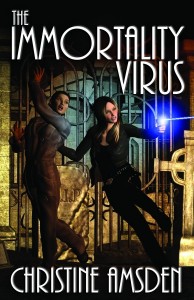Today we welcome Christine Amsden, author of The Immortality Virus. Christine is the first indie author to take me up on my offer of guest posts here, and I’ve got one scheduled weekly for the next two weeks as well. She’ll tell us a little about her book and where the idea came from. You can check it out on Amazon here, and on Barnes & Noble here.
Dreams of Immortality
Inspiration never strikes me all at once. It grows from seeds, and it takes time to blossom. When it came to “The Immortality Virus,” it all began with Wikipedia, and the “random article” button. My debut novel, “Touch of Fate,” had just been released and all I had were vague notions of doing something more science fiction than fantasy for my second book.
I like to tell beginning writers that ideas are cheap, and they’re everywhere — in the news, in the fight you had with your best friend, in your dreams, and even in Wikipedia. An article on DNA led me to look into a genetic cause for old age, which led me to consider a world in which that did not happen. How? With The Change, an event that, in my world, takes place in the mid 21st century, though no one is sure precisely when. Most people barely noticed the odd strain of flue that hit so many people that year, nor did they connect their fevers and runny noses to the life-changing event that followed.
What would cause an entire race to stop aging? If immortality were for sale, it would go to the highest bidder, and not everyone would have access. For a fundamental change to the human genetic makeup, we needed something else: Biological warfare. An engineered virus, highly contagious and capable of altering DNA on a cellular level. I drew this idea from a novel by Orson Scott Card: Xenocide.
Who would do such a thing, though? And how? This was probably the toughest part of the entire process, and one that took several revisions to perfect. My heroine and sole point of view character, Grace Harper, was a far easier character to create than the elusive Jordan Lacklin, who we get to know mostly through old journal entries. First, he had to be smart, capable, and armed with a lifetime of experience, so I gave him a background in developing biological weapons for the military. Then, I had to turn him into someone who honestly believed the entire race would be better off if they didn’t age. Deep inside, I wanted him to be a good person, with good intentions, even if they didn’t work out very well. So I gave him a wife, a woman he loved deeply, a woman who was there in body, but who, thanks to Alzheimer’s Disease, had pretty much gone in every other way that mattered. He did it for her, and for everyone else who might have to experience similar pain. Growing old, he believed, was the worst thing that could happen to people.
After that, I spent a lot of time working on his journal entries. The ones in the book are sort of the highlights, the ones I hoped would convey his motives and character most concisely. He’s a complicated man, however, and by the time I finished with him he had become, at least in my mind, more than a tool to implement The Change. He and The Change have kind of blurred together a little bit in my mind, so that despite the results, I think of the actual event as a work of honest human compassion, and a sign of the best humanity has to offer. I suppose the message there is that we sometimes don’t know what’s best for us.
I began working on “The Immortality Virus” in the summer of 2006, and finished it in the fall of 2008. It wasn’t a smooth process, as I set the manuscript down several times while I worked on other things, and at some points I wasn’t sure it would ever be truly finished. Perhaps it still isn’t. I did leave the end open for a sequel, even if I haven’t written it yet, and I hope to one day revisit the world and the possibilities therein.
Thanks for stopping by, Christine, and I hope you have great success with your book!








Enjoyed the guest blog. Always good to hear what fellow ‘indie’ authors are up to. Best of luck on your new venture.